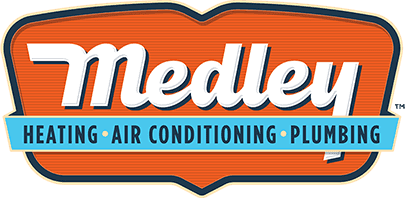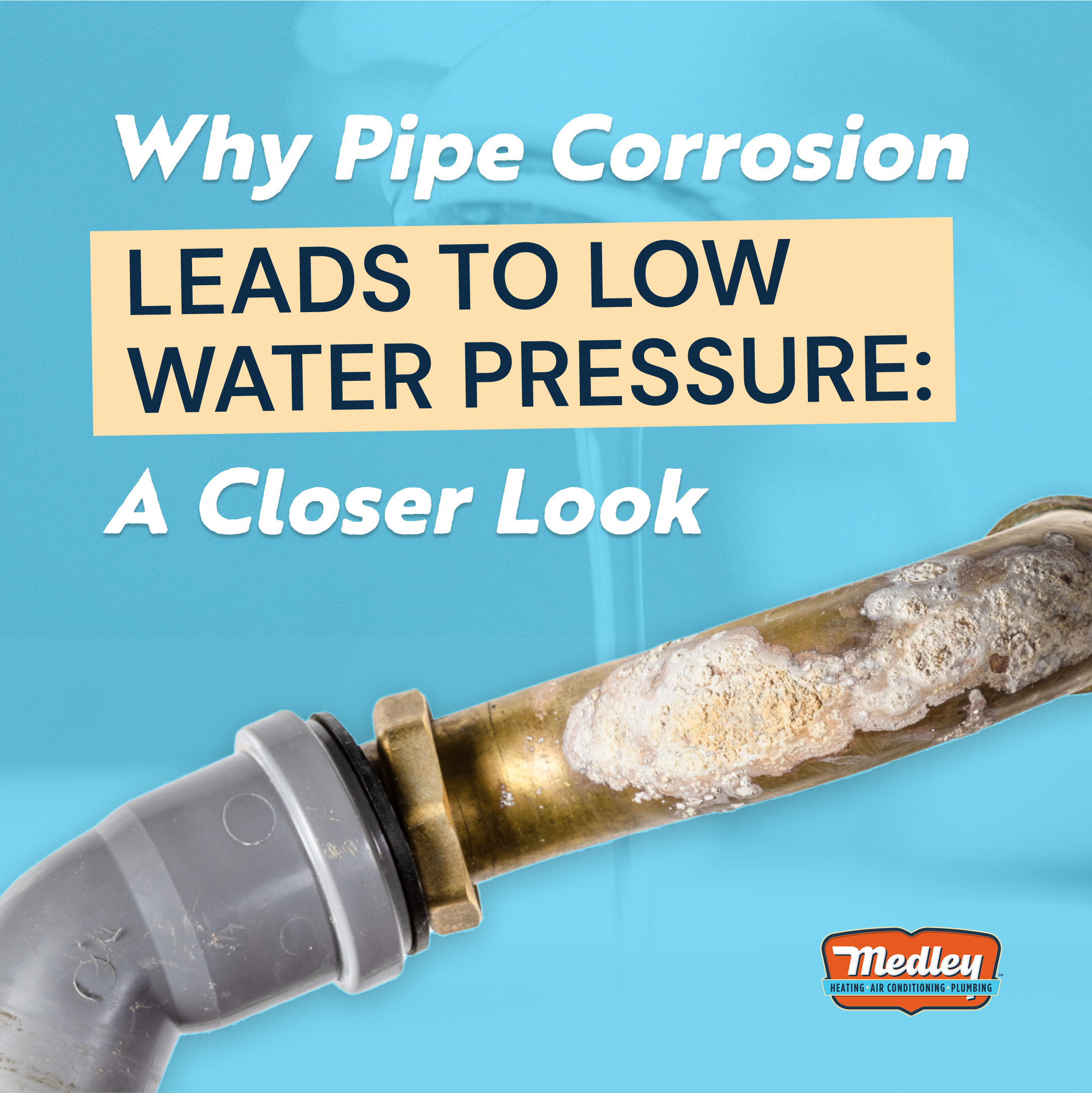Pipe corrosion is a serious problem that occurs in homes with metal pipes and often leads to a decrease in water pressure. If you are experiencing low water pressure in your Irving, TX, home and suspect pipe corrosion is the culprit, give Medley Heating, Air Conditioning and Plumbing a call. Our plumbers will find the source of the problem and help you find the best, most cost-effective way to fix it. Medley offers up-front pricing and helpful financing options, so you know exactly what to expect without any surprise bills or add-ons.
What Is Pipe Corrosion?
Pipe corrosion occurs in metal pipes, making them more brittle until they eventually dissolve over time. The most common form of corrosion is rusting, which happens because of chemical reactions between the metal and the oxygen in the water (oxidation). Rusting results in plumbing pipe deterioration, which can change the water pressure levels in your home.
How Pipe Corrosion Causes Low Water Pressure
Corrosion is a problem that affects your water pressure due to the following reasons.
Build-up inside pipes
One of the biggest plumbing system issues caused by corrosion is sediment build-up. Rust flakes off over time and accumulates, often in turns and joints in the system, narrowing the pipes and restricting the water flow.
Leaks from corrosion
A pipe leak is one of the biggest culprits when it comes to rusty pipes and water pressure drops. Rust eats away at the side of a pipe until the water can escape, lowering the pressure in your faucet or shower head.
Blocked fixtures
Due to flaking rust, your fixtures can become blocked, reducing the amount of water that can pass through. Over time, this problem noticeably affects your water pressure.
Signs Your Pipes May Be Corroded
The following are some common signs your pipes are corroded.
Water quality changes
Pipe corrosion doesn’t just cause low water pressure — it can also cause other problems like changes in your water quality. You may notice discolored water, or it may smell or taste strange. If your water quality changes, it’s time to call a plumber.
Physical changes in pipes
Some signs of pipe corrosion are visible from the outside. If you notice rusting, holes, or flaking in your pipes, you’ll likely need to replace your plumbing.
Water pressure symptoms
Low water pressure is annoying, but it’s also a sign that there’s a problem in your pipes. It’s characterized by less water coming out of the tap or shower and a reduction in your toilet’s flushing capability.
Common Causes of Pipe Corrosion
Here are some of the most common reasons pipes corrode.
Water chemistry issues
One of the most common causes of low water pressure is corrosion. When metals oxidize, the sides rust and flake away, leading to holes in the pipes and clogs created by buildup.
Aging plumbing systems
Older pipes are more prone to breaking down, partially because they’re not made to handle modern water usage and because they’ve been exposed to oxygen and other elements for longer. Corrosion in galvanized pipes is dangerous. Over time, the protective zinc on the surface of the pipes breaks down and exposes the steel, which can rust and leach metals into your drinking and bathing water.
Environmental factors
If the water’s pH is acidic or the pipes carry hot water, they’ll be more likely to corrode. Certain types of bacteria or minerals in the water can also speed up the process.
How To Fix and Prevent Pipe Corrosion
Common ways a plumber will fix and prevent pipe corrosion in your home include the following:
Repairing corroded pipes
Plumbers can repair some corroded pipes by reinforcing damaged areas. Sometimes, simply replacing the pipe is often easier, more cost-effective, and will last longer.
Upgrading to corrosion-resistant materials
Depending on the pipes and their use, your plumber may wish to upgrade them to stainless steel, PVC, or PEX pipes.
Preventative maintenance tips
Homeowners can purchase a water softener to reduce minerals and acidic water from damaging pipes. Hiring a plumber to perform regular preventative maintenance and pipe cleaning helps prevent corrosion damage.
Why Professional Help Is Essential for Corrosion-Related Issues
It’s not advisable for an amateur to try a DIY fix on corroded plumbing. A professional can help by doing the following.
Detecting hidden corrosion
Along with low water pressure, some ways to know if your pipes are corroding include looking for leaks or damp spots in the walls and ceilings, flaky or rusty fixtures, strange-smelling or tasting water, and water discoloration. If you suspect your pipes are corroding, call Medley. We can find the source of the problem and fix the issue for you.
Ensuring long-term solutions
At Medley, our plumbers are experienced in finding and fixing all manner of plumbing problems. They’ll locate the corroded areas and fix the issue using time-tested, lasting solutions. They’ll also replace the old pipes with new, corrosion-resistant piping, so you don’t have to worry.
Providing cost-effective early intervention
If there’s a problem with your plumbing system, call your local expert plumbers today. The sooner you deal with the issue, the fewer problems you’ll have. If you leave corroding pipes too long, they may leak and cause water damage, mold, and serious structural issues.
Contact Medley for All Your Plumbing Needs
Whether you want to know the pros and cons of a tankless water heater or need your entire home re-piped, call Medley today. We’ll help you with your corroded pipes and water flow issues as soon as possible so you can stop worrying. Contact us today to schedule a service.
FAQs About Pipe Corrosion and Water Pressure
Can pipe corrosion happen in all types of pipes?
No, PEX and PVC pipes don’t corrode like metal pipes, making them a popular choice for many plumbing applications.
Is pipe corrosion something that can be prevented?
If you have metal pipes, corrosion can’t be 100% prevented. Still, you can slow it down by using special coatings, minimizing the water velocity in the pipes, and keeping the water temperature below 180°F.
Can corroded pipes affect water quality?
Yes. Water that flows through corroded pipes will be discolored, or it may smell or taste strange. Certain contaminants, like copper and lead, are dangerous to your health, while other leached minerals simply change the water’s taste, appearance, or smell.
Will corroded pipes eventually cause leaks or bursts?
Yes. Over time, the sediment from the corrosion accumulates in the pipes, joints, or fixtures, causing them to leak or burst. This is especially true in areas with hard water, as more minerals will worsen the buildup.

